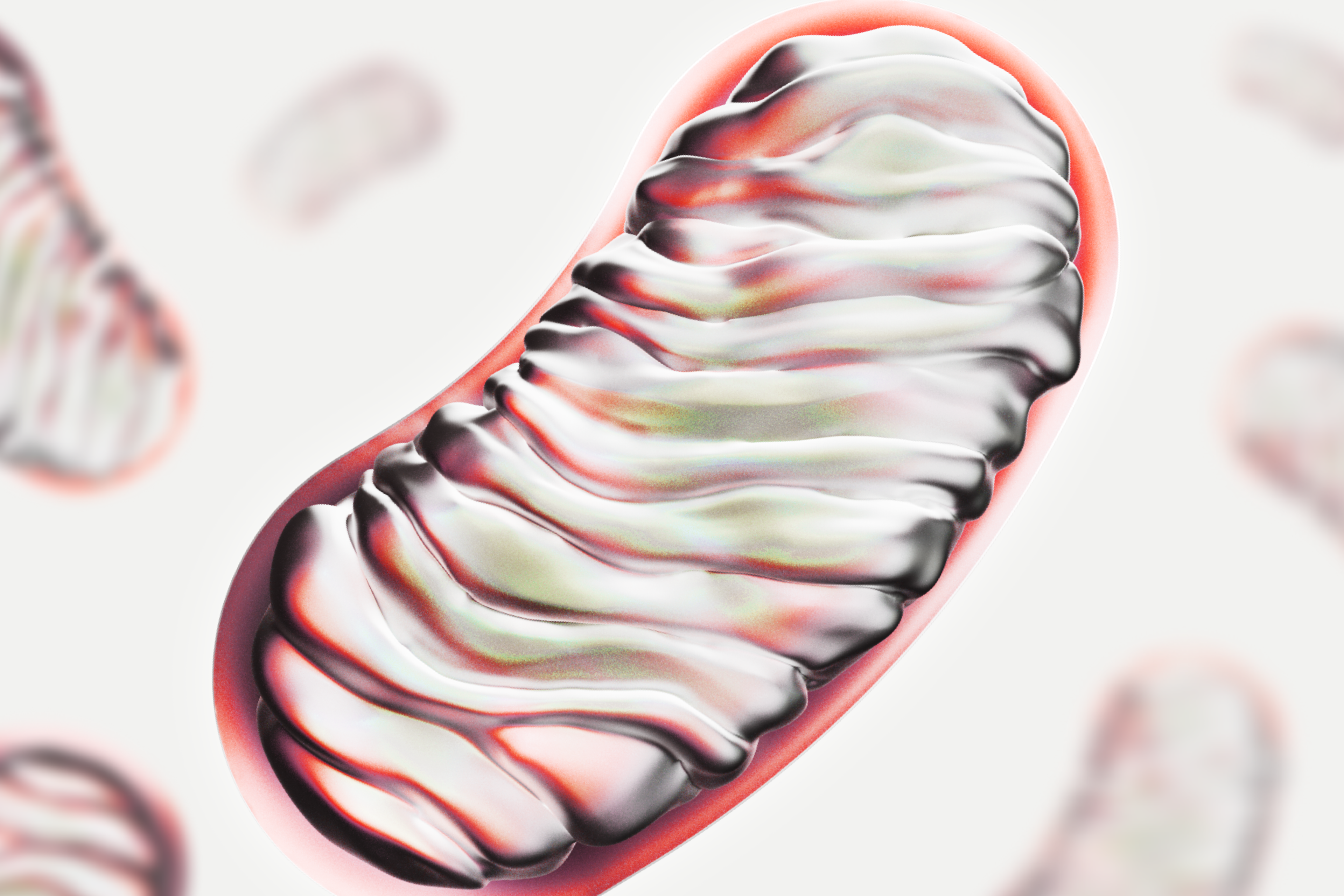Cortisol's impact on sleep: the stress-hormone connection
Cortisol's impact on sleep: understanding the stress-hormone connection and its implications for rest, health, and longevity

August 23, 2024
7 min read
Sufficient, good-quality sleep is known to be important when it comes to maintaining good health. However, many factors can disrupt sleep, including high levels of stress. The body’s stress hormone, cortisol, may be elevated in these situations and play a role in this disruption.[1]

Science of good sleep
Cycles of sleep and wake states are regulated by a number of signals in the body. Several “sleep hormones,” including cortisol and melatonin, play a role in this process and are key to adequate sleep quantity and quality. Other hormones critical to human health are also released during sleep.
Understanding the relationship between these hormones and sleep can provide insights into how sleep affects overall health and longevity.
Melatonin
Melatonin is produced and released in the brain and has direct effects on sleep regulation. It is known as the ‘hormone of darkness’ and is secreted in the absence of light. It helps regulate the timing of sleep, signaling to the body that it is time to go to bed. It rises in the evening and peaks in the early morning.[2]
Cortisol
Cortisol, in contrast, rises in response to light exposure in the morning. It is important for dealing with stressors on the body[3]. Levels are high in the morning and low at night, following a circadian rhythm that helps regulate the sleep-wake cycle.
Research shows that a healthy cortisol rhythm, where levels drop significantly from sleep onset to awakening, is associated with better subjective sleep quality, especially in older adults.[4]
Growth hormone
Growth hormone is also released in a cyclical fashion and is mostly secreted during deep sleep. It helps to maintain body structure and plays a role in muscle repair. Too little sleep may result in less growth hormone and impaired muscle repair.[5]
As we age, we experience a decline in growth hormone, which is paralleled by a decrease in deep sleep and an increase in evening cortisol levels. This disruption in the sleep-wake cycle and the hypothalamic-pituitary-adrenal (HPA) axis may contribute to the aging process.
Ghrelin and leptin
Ghrelin and leptin are hormones that promote hunger and satiety, respectively. Quantity of sleep has been shown to affect levels of these hormones. Imbalances may lead to increases in hunger and risk of weight gain.[6]

About cortisol
Cortisol is made from cholesterol and has a variety of effects on the body. It is able to affect almost all organ systems. It is not only involved in the stress response but also in regulating metabolism, inflammation, and immunity.[7]
Cortisol is made from cholesterol and has a variety of effects in the body. It can affect almost all organ systems and is involved in regulating metabolism, inflammation, and immunity. Sustained high cortisol levels and cortisol dysregulation are associated with several health concerns, in addition to its negative impact on sleep.[8]
Cortisol and sleep
Research studies have revealed a relationship between cortisol levels, sleep cycles, and sleep quality. For example, one study explored the relationship between stress, sleep, and cortisol levels. Researchers tracked healthy participants over eight days and found that greater stress levels were associated with shorter sleep and higher waking cortisol levels. These findings revealed the potential impact of stress on sleep and cortisol levels.[9]
Disruptions in sleep have also been shown to be associated with a rise in cortisol levels and affect the circadian release pattern of this hormone. [10]In a study of type 2 diabetics, for example, sleep problems were associated with disturbances in cortisol responses to stress and changes in cortisol levels. Those who had greater sleep problems had higher levels of cortisol throughout the course of the day.[11]
Longevity hacks for better sleep
Given the importance of sleep for health and longevity, a focus on sufficient quantity and quality of sleep is important. There are several possible ways to improve sleep that take into account the action of hormones and how sleep is regulated.
Increase natural daylight exposure
Living in urban environments may lead to altered light exposure, including less natural light during the daytime and less darkness during the night. Given this, expert recommendations have been developed for optimal exposure to light.[12] These include exposure to daylight whenever possible and the additional use of electric lighting when needed.
At night, exposure to light should be kept at a minimum, with the sleep environment being kept as dark as possible.[13]

Exercise
Physical activity has been shown to be associated with better sleep quality. [14]Those who are more active generally sleep longer and are able to fall asleep faster. These results have been found both in children and adults.[15]
Cognitive behavioral therapy
Stress management using cognitive behavioral therapy is another strategy to improve sleep. This approach involves changing beliefs and unrealistic expectations related to sleep[16]. A study in older adults, for example, showed that an eight-week mindfulness-based cognitive therapy program resulted in improvement in sleep problems, as well as less anxiety and fewer depressive symptoms.[17]
Consume a healthy diet
Previous research suggests that eating the right quantity and quality of food containing all the essential nutrients may be important for good sleep. This includes consuming a diet with enough of the macronutrients carbohydrates, protein, and fat, as well as enough of key nutrients such as omega-3 fatty acids. Limiting highly processed food may also be important.[19] However, more studies are needed to understand the relationship between nutrition and sleep.[18]
Wrapping up
Understanding the intricate relationship between cortisol, sleep, and longevity highlights the importance of maintaining good sleep hygiene as part of a healthy lifestyle.
Managing stress effectively, ensuring sufficient and high-quality sleep, and adopting healthy lifestyle habits such as regular exercise, a balanced diet, and proper light exposure can help maintain a healthy cortisol rhythm, support better sleep, and enhance your overall well-being.
Incorporating these strategies into your daily routine not only improves sleep but may also extend your healthy years, enabling you to live a longer, more vibrant life.
References
- ↑
Hirotsu C, Tufik S, Andersen ML. Interactions between sleep, stress, and metabolism: From physiological to pathological conditions. Sleep Sci. 2015 Nov;8(3):143-52. doi: 10.1016/j.slsci.2015.09.002. Epub 2015 Sep 28. PMID: 26779321; PMCID: PMC4688585.
- ↑
Dijk DJ, Cajochen C. Melatonin and the circadian regulation of sleep initiation, consolidation, structure, and the sleep EEG. J Biol Rhythms. 1997 Dec;12(6):627-35. doi: 10.1177/074873049701200618. PMID: 9406038.
- ↑
Baranwal N, Yu PK, Siegel NS. Sleep physiology, pathophysiology, and sleep hygiene. Prog Cardiovasc Dis. 2023 Mar-Apr;77:59-69. doi: 10.1016/j.pcad.2023.02.005. Epub 2023 Feb 24. PMID: 36841492.
- ↑
Pulopulos, M., Hidalgo, V., Puig-Perez, S., Montoliu, T., & Salvador, A. (2020). Relationship between Cortisol Changes during the Night and Subjective and Objective Sleep Quality in Healthy Older People. International Journal of Environmental Research and Public Health, 17. https://doi.org/10.3390/ijerph17041264 (https://www.google.com/url?q=https://doi.org/10.3390/ijerph17041264&sa=D&source=docs&ust=1724421896606430&usg=AOvVaw1t7uASSOUXPD6RfZe2t2NI).
- ↑
Baranwal N, Yu PK, Siegel NS. Sleep physiology, pathophysiology, and sleep hygiene. Prog Cardiovasc Dis. 2023 Mar-Apr;77:59-69. doi: 10.1016/j.pcad.2023.02.005. Epub 2023 Feb 24. PMID: 36841492.
- ↑
van Egmond LT, Meth EMS, Engström J, Ilemosoglou M, Keller JA, Vogel H, Benedict C. Effects of acute sleep loss on leptin, ghrelin, and adiponectin in adults with healthy weight and obesity: A laboratory study. Obesity (Silver Spring). 2023 Mar;31(3):635-641. doi: 10.1002/oby.23616. Epub 2022 Nov 20. PMID: 36404495.
- ↑
Thau L, Gandhi J, Sharma S. Physiology, Cortisol. [Updated 2023 Aug 28]. In: StatPearls [Internet]. Treasure Island (FL): StatPearls Publishing; 2024 Jan-. Available from: https://www.ncbi.nlm.nih.gov/books/NBK538239/ - ↑
Thau L, Gandhi J, Sharma S. Physiology, Cortisol. [Updated 2023 Aug 28]. In: StatPearls [Internet]. Treasure Island (FL): StatPearls Publishing; 2024 Jan-. Available from: https://www.ncbi.nlm.nih.gov/books/NBK538239/
- ↑
Sladek MR, Doane LD, Breitenstein RS. Daily rumination about stress, sleep, and diurnal cortisol activity. Cogn Emot. 2020 Mar;34(2):188-200. doi: 10.1080/02699931.2019.1601617. Epub 2019 Apr 8. PMID: 30961457; PMCID: PMC6783329.
- ↑
Nollet M, Wisden W, Franks NP. Sleep deprivation and stress: a reciprocal relationship. Interface Focus. 2020 Jun 6;10(3):20190092. doi: 10.1098/rsfs.2019.0092. Epub 2020 Apr 17. PMID: 32382403; PMCID: PMC7202382.
- ↑
Hackett RA, Dal Z, Steptoe A. The relationship between sleep problems and cortisol in people with type 2 diabetes. Psychoneuroendocrinology. 2020 Jul;117:104688. doi: 10.1016/j.psyneuen.2020.104688. Epub 2020 Apr 23. PMID: 32353817; PMCID: PMC7302424.
- ↑
Brown TM, Brainard GC, Cajochen C, Czeisler CA, Hanifin JP, Lockley SW, Lucas RJ, Münch M, O'Hagan JB, Peirson SN, Price LLA, Roenneberg T, Schlangen LJM, Skene DJ, Spitschan M, Vetter C, Zee PC, Wright KP Jr. Recommendations for daytime, evening, and nighttime indoor light exposure to best support physiology, sleep, and wakefulness in healthy adults. PLoS Biol. 2022 Mar 17;20(3):e3001571. doi: 10.1371/journal.pbio.3001571. PMID: 35298459; PMCID: PMC8929548.
- ↑
Brown TM, Brainard GC, Cajochen C, Czeisler CA, Hanifin JP, Lockley SW, Lucas RJ, Münch M, O'Hagan JB, Peirson SN, Price LLA, Roenneberg T, Schlangen LJM, Skene DJ, Spitschan M, Vetter C, Zee PC, Wright KP Jr. Recommendations for daytime, evening, and nighttime indoor light exposure to best support physiology, sleep, and wakefulness in healthy adults. PLoS Biol. 2022 Mar 17;20(3):e3001571. doi: 10.1371/journal.pbio.3001571. PMID: 35298459; PMCID: PMC8929548.
- ↑
Sejbuk M, Mirończuk-Chodakowska I, Witkowska AM. Sleep Quality: A Narrative Review on Nutrition, Stimulants, and Physical Activity as Important Factors. Nutrients. 2022 May 2;14(9):1912. doi: 10.3390/nu14091912. PMID: 35565879; PMCID: PMC9103473.
- ↑
Reid KJ, Baron KG, Lu B, Naylor E, Wolfe L, Zee PC. Aerobic exercise improves self-reported sleep and quality of life in older adults with insomnia. Sleep Med. 2010 Oct;11(9):934-40. doi: 10.1016/j.sleep.2010.04.014. Epub 2010 Sep 1. PMID: 20813580; PMCID: PMC2992829.
- ↑
MacLeod S, Musich S, Kraemer S, Wicker E. Practical non-pharmacological intervention approaches for sleep problems among older adults. Geriatr Nurs. 2018 Sep-Oct;39(5):506-512. doi: 10.1016/j.gerinurse.2018.02.002. Epub 2018 Mar 9. PMID: 29530293.
- ↑
Foulk MA, Ingersoll-Dayton B, Kavanagh J, Robinson E, Kales HC. Mindfulness-based cognitive therapy with older adults: an exploratory study. J Gerontol Soc Work. 2014;57(5):498-520. doi: 10.1080/01634372.2013.869787. Epub 2014 Jun 24. PMID: 24329497.
- ↑
Netzer NC, Strohl KP, Pramsohler S. Influence of nutrition and food on sleep-is there evidence? Sleep Breath. 2024 Mar;28(1):61-68. doi: 10.1007/s11325-023-02921-1. Epub 2023 Sep 23. PMID: 37740061; PMCID: PMC10954981.
- ↑
Sejbuk M, Mirończuk-Chodakowska I, Witkowska AM. Sleep Quality: A Narrative Review on Nutrition, Stimulants, and Physical Activity as Important Factors. Nutrients. 2022 May 2;14(9):1912. doi: 10.3390/nu14091912. PMID: 35565879; PMCID: PMC9103473.
Authors
Jinan Banna, PhD, RD


